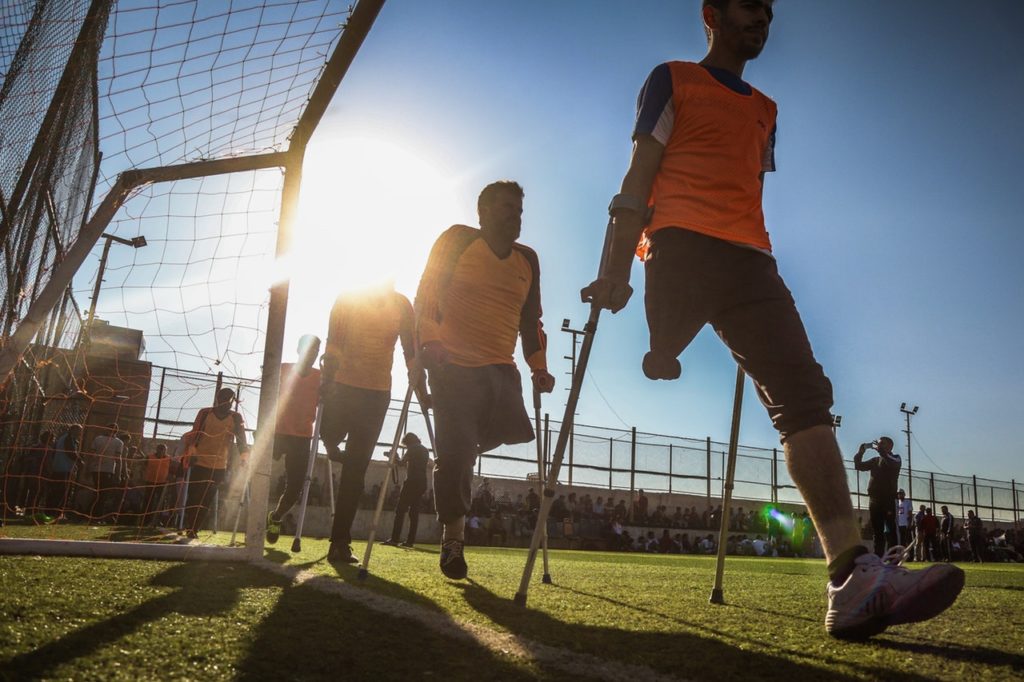SURVIVING SURVIVAL: A PLEA TO BETTER THE LIVES THAT ARE BEING SAVED, AFTER THEY ARE SAVED
 By Ashley Scott, Key Correspondent for the Irish Global Health Network
By Ashley Scott, Key Correspondent for the Irish Global Health Network
On Thursday 12th September 2019, I had the privilege to attend Dr. Cliona O’Sullivan’s aptly named talk: “Is Survival Enough? Strengthening Rehabilitation Towards the 2030 Agenda”, a presentation on the need to strengthen rehabilitation systems, especially in low- and middle-income countries.
Coming from a low-income area of rehabilitation myself, my eyes lit up immediately! Dr O’Sullivan put out a thought that has been on most rehabilitation professional’s minds for a while: how are our patients surviving their survival?
Dr O’Sullivan painted the picture for us, describing that 80% of the world’s disabled population lives in less highly-developed countries, with the disabled population in need of rehabilitation services. She quoted the World Health Organisation: “Global trends in health and aging require a major scaling up of rehabilitation services in countries around the world and in low- and middle- income countries in particular”. With improving access to medication and healthcare, and with populations living longer, there is a much greater need for rehabilitation services.
Dr. O’Sullivan explained how rehabilitation aims to assist those likely to experience or experiencing a disability to be able to function within their environment. With Non-Communicable Diseases (NCDs) becoming more prevalent and populations surviving these, the need for rehabilitation after amputations due to uncontrolled diabetes, or stroke rehabilitation is increasing drastically. With the majority of those affected by NCDs being in their main productive years, being able to live well is vital – more so than simply surviving the disease.
Dr O’Sullivan also reported that lack of rehabilitation workers is one of the challenges in strengthening rehabilitation programs – for example, in one of the multiple African countries in which she researches, there were only approximately 30 physiotherapists.
Integration of rehabilitation services into health systems presents a further challenge, due to a lack of knowledge of the human resources available. Dr. O’Sullivan also named governance, financial resources, and education and training as further needs for strengthening rehabilitation systems. In the subsequent Q & A, she explained that rehabilitation is not as popular as other healthcare programs seeking funding, and thus it can be very difficult and competitive in finding funding for rehabilitation services and research.
To strengthen the presence of rehabilitation in the global health space, Dr. O’Sullivan recommended that collaboration and discussion needs to take place between Universities (globally), NGOs, and investors. She noted that more focus is needed on strengthening of competency-based programmes towards matching skillsets with populations, as well as shifting tasks as a part of a modular structure to advance competencies. Survival is not enough.
Lastly, she recommended more focus on educational technology to strengthen rehabilitation services.
All health care professionals and funders should take Dr O’Sullivan’s plea for strengthening rehabilitation programs in low- and middle-income countries seriously, because there is no point in adding years to life, if we as health care professionals cannot add life to years.
27 September 2019
Written by Ashley Scott
BSc. Occupational Therapy (WITS); MSc. Global Health Student (TCD)
CATEGORIES
- Equity in Action Blog
- Training Programmes
- Sponsorship
- Vaccine Equity
- Get Global – Global Health Talks
- Student Outreach Team
- Get Global Young Professionals Talk Global Health
- Global Health Matters – Live Event Series
- Global Health Matters – IGHN Live Event Series
- An initiative of Irish Global Health Network
- ESTHER Ireland and ESTHER Alliance for Global Health Partnerships
- Global Health Matters – Webinar Series
- ESTHER
- IGHN Conferences
- Global Health Conference 2020
- Women in Global Health – Ireland Chapter
- ESTHER Partnerships
- Weekly Webinar Series
- 4th Global Forum on HRH
- Access to Medicines
- Archive Page Weekly COVID Webinars
- Clean Cooking 2019
- Climate Change and Health Conference 2017
- Conference Abstracts
- Conference Materials
- Covid FAQ
- COVID Funding Opportunities
- COVID-19
- COVID-19: Gender Resources
- Dashboard and online resources
- Education
- ESTHER Alliance
- Events
- Events & News
- Funding covid
- Global Health Exchange 2018
- Global Health Exchange 2019
- Global Health symposium 2019
- Health Workforce/HRH
- Homepage Featured
- Homepage recent posts
- IFGH 2011-2012 Conference and Events
- IFGH 2014 Conference
- IFGH Multimedia
- Irish AIDS Day 2017
- Irish News and Feeds
- Key Correspondent Articles
- Key Correspondent News
- Maternal Health
- Multimedia
- News
- News & Events
- Newsletter
- Opportunity
- Our LMIC's Resources for COVID19
- Partner Country News and Feeds
- Past Events
- Policy
- Presentations
- Recurring events
- Reports & Publications
- Research
- Resources
- Student Outreach Group
- Students Corner
- TEDTalks
- TRAINING COURSES FOR HEALTH CARE PROFESSIONALS
- Uncategorized
- Upcoming Events
RECENT POSTS

Imagine a world without nurses

Making Therapy Accessible: Reimagining Mental Health Through Traditional Healing and Language by Talha AlAli

Decolonisation as a framework for Youth Partnership in Global Health by Arwa Hany Sharaby

“Fight the bullies!”

SOT Pre-Conference Event 2025


 By Ashley Scott, Key Correspondent for the Irish Global Health Network
By Ashley Scott, Key Correspondent for the Irish Global Health Network